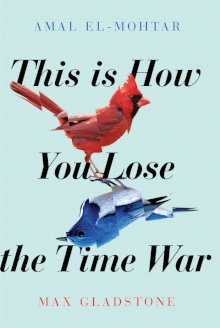I bought this largely because it’s a meme book and I was curious what the fuss was all about. This was originally published in 2019 and won some awards. But it only went viral earlier this year due to a tweet and shot straight up to the top of the bestseller charts. It’s a science-fiction romance story written in an epistolary format by its two co-authors, so really not something that I usually read. The pattern of the correspondence felt obvious and repetitive to me early and there’s really only one way a story like this can end. Still, the quality of the prose and the intensity of the emotions it evokes just about won me over towards the climax.
The story begins with Red surveying the aftermath of some far future battlefield. She is a time-travelling operative of a faction called the Agency, tasked with shaping the threads of time to conform with the version of history preferred by her Commandant. In addition to being immensely skilled and able to travel through time at will, she is equipped with incomprehensibly deadly cybernetic implants. On the battlefield, she finds a letter, written on a sheet of cream-colored paper, that does not belong. It was written by Red’s counterpart, Blue, who works for the Garden faction and is meant for her. Everything the Agency achieves through machinery and computer intelligence, the Garden matches with its mastery of bioengineered organisms and hivemind. Blue writes to commend Red on her competence and to thank her for making her missions more challenging and interesting. She also taunts Red that her efforts are futile and that Garden will ultimately prevail. Naturally during Blue’s next mission to manipulate the results of an MRI reading, she finds Red’s response in the form of a jar of water. So begins their correspondence across time, space and multiple realities, that starts as mutual baiting but inevitably turns into love.
The entire book consists of this back and forth pattern. Over the course of their missions Red and Blue visit all manner of exotic locales under all sorts of assumed identities: a pilgrim to a temple in a cave deep underground, a warrior in the camp of Genghis Khan, one of many versions of sunken Atlantis, their own home realities and many more. We only ever get one brief look at each of the settings however and there aren’t really any characters other than Red and Blue. The poetic prose vividly evokes the imagery of machine intelligences that are larger than stars, of hiding messages in the taste and smell of a cup of hot, swirling tea, of starships and battle stations fighting around planets and so much more. Yet it’s all descriptive fluff that feels inconsequential as you know you’ll never revisit any of these locations. I don’t consider there to be any serious worldbuilding either. The Agency and the Garden may be thematically different, yet are mirror opposites of each other. All we need to know is that they are striving for mutually incompatible realities, they always have and they always will.
The intensity of the emotions between Red and Blue though truly are something else. One recurring expression of an all consuming love is wanting to gobble up one’s lover, to make the other forever and irrevocably part of oneself. Through the magic of time travel and advanced technology, this book explores this kind of imagery to an extent otherwise impossible. The joy and exultation of throwing away everything else, their friends and what passes for family, their faction and ideology, entire worlds and realities, just to be with each other is heady stuff. So too is living through untold eons of deeply embedded false identities in different timelines, each with their own set of memories and net of relationships, and seeing only each other as the only constant, the only anchor that feels real. The ending is perfectly predictable but also feels so inevitable and well deserved that I can’t begrudge it. This may not be my usual cup of tea but I can totally see why it has won over so many readers.
As enjoyable as this book was, this was a one off for me as I still prefer something that is more properly science-fiction. Apart from Red and Blue, everything else doesn’t feel quite real and though their actions must have tremendous consequences for their respective factions and many worlds, it’s not the point of the story at all to explore any of that. It’s a fun read and it’s good to venture out of my comfort zone every now and then but I wouldn’t want to make a habit out of reading books in this style.
